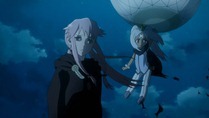 |
 |
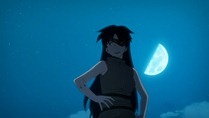 |
I can already see that this episode has caused probably the widest rift yet among the viewers – both manga readers and anime-only alike.
To the former group, I would make this argument in defense of episode 25 – an anime is not a manga. Maybe it’s because we’re so close on the heels of Another going off the rails in the last two eps and folks are sensitive about it, but the turn towards action in the penultimate episode of Mirai Nikki is very different in my view. In the first place, there’s plenty of action at this stage in the manga, too – it’s just fleshed-out and much punchier in the anime (and for me, that’s good). And to the second group, all I can say is – trust me, this is not another Another. This is faithful to the spirit of the original, even if it’s turned up to eleven.
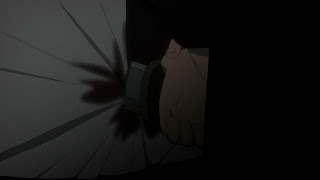 If you can’t tell, this episode totally worked for me. It felt like it lasted about five minutes (always a good sign) and I found this omake to be one of the funniest and most relevant so far. How you feel about the ending itself is one question – I’d advise new viewers to wait until after next week to decide – but in terms of execution, I’m a very happy manga reader. An anime adaptation should be about keeping the spirit of a manga alive but making it better, more alive. There were times during the first cour where I wistfully wished someone like Production I.G. or ufotable had done this, so the visuals would have been flashier and smoother. But I’ve lately come to think that Asread was a good choice because, at heart, Mirai Nikki is a great trashy comic book. I like that this anime is obviously low-rent, but stylish and fantastical – a guerilla animation rather than a massive army endeavor. I think the visuals this week were terrific, because it really looked like a manga come to life on the screen. I liked Murumuru’s unsealed form, which is used much more extensively here than in the manga – again, an anime has to be different from a manga for it to work.
If you can’t tell, this episode totally worked for me. It felt like it lasted about five minutes (always a good sign) and I found this omake to be one of the funniest and most relevant so far. How you feel about the ending itself is one question – I’d advise new viewers to wait until after next week to decide – but in terms of execution, I’m a very happy manga reader. An anime adaptation should be about keeping the spirit of a manga alive but making it better, more alive. There were times during the first cour where I wistfully wished someone like Production I.G. or ufotable had done this, so the visuals would have been flashier and smoother. But I’ve lately come to think that Asread was a good choice because, at heart, Mirai Nikki is a great trashy comic book. I like that this anime is obviously low-rent, but stylish and fantastical – a guerilla animation rather than a massive army endeavor. I think the visuals this week were terrific, because it really looked like a manga come to life on the screen. I liked Murumuru’s unsealed form, which is used much more extensively here than in the manga – again, an anime has to be different from a manga for it to work.
I’ve debated how much to talk about the nuts & bolts of the story here – what I really wish is that there were a good Mirai Nikki timeline somewhere I could link to, because trying to explain that stuff is not my preferred method of blogging. As a manga reader it’s hard for me to tell how coherently this is coming off, but it seems as though it’s making as much sense as something so convoluted could possible make. You need to know that there are three worlds that exist for dramatic purposes, and how the characters we’re currently watching fit into those worlds. Basically, Yuno #1 and Yuki #2 are the main protagonists of the story, though both are in World #3 (along with Minene #2, though as a Demi-Goddess I think the distinction is somewhat meaningless in her case). Of course, then there’s the special “world” (Why Rei, why?) that Yuno #1 – who has already won her survival game, though it brought her no satisfaction – created for Yuki #2 in a moment of compassion. I don’t consider that a true world, since it only exists as a bubble around Yukiteru – but we’re getting way too technical here.
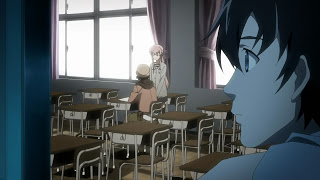 Indeed, it strikes me that Mirai Nikki acts almost as a deconstruction – or at least a satire – of the sci-fi/fantasy genres of anime. Basically Esuno-sensei has taken everything fans rail against in those shows – dead characters coming back to life, “reset buttons”, divine power-ups – and made them the heart of his plot. Hell, he’s even taken the dreaded Deux ex Machina and put it in the hands of – “Deus ex Machina”! Make no mistake, he’s winking at us here – and for me it works, because all of those unforgivable plotquakes make perfect sense in Future Diary. And not just sense, but the story couldn’t even exist without them. That’s the true genius of this construction, though I suspect a lot of readers probably cared a lot less about that than the more superficial pleasures the series offers.
Indeed, it strikes me that Mirai Nikki acts almost as a deconstruction – or at least a satire – of the sci-fi/fantasy genres of anime. Basically Esuno-sensei has taken everything fans rail against in those shows – dead characters coming back to life, “reset buttons”, divine power-ups – and made them the heart of his plot. Hell, he’s even taken the dreaded Deux ex Machina and put it in the hands of – “Deus ex Machina”! Make no mistake, he’s winking at us here – and for me it works, because all of those unforgivable plotquakes make perfect sense in Future Diary. And not just sense, but the story couldn’t even exist without them. That’s the true genius of this construction, though I suspect a lot of readers probably cared a lot less about that than the more superficial pleasures the series offers.
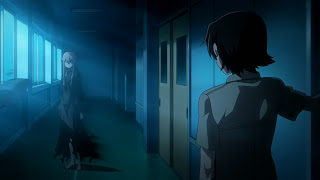 And make no mistake, there are many of those. I think we have possibly our most profound character moment of the series in this episode, when Yuno #1 says to “Yukkii”, “I would have loved anyone as long as I became dependent on them. And you would have loved anyone as long as she protected you.” In that phrase Yuno sums up the whole twisted, dysfunctional yet oddly poignant nature of the Yukitero/Yuno relationship (and a good many real-world ones too). In a sense it’s an almost selfless and mature Yuno speaking those words – I mean, given that she’s about to go off killing people again – and at the very least, one who’s gained a sort of perverse sense of perspective through her trials. She’s doing what she sees as a kindness for this Yukkii, though he obviously can’t accept it as such. I also thought the moment when Yuno #3’s father arrived home full of concern for his daughter (playing up a distinct difference between the worlds) was superbly done – Yuno has a true catch-in-the-throat moment when she realizes this man truly loves her counterpart in this world – and then when he notices something isn’t right, she immediately stabs him. Yuno herself comments on the paradox of her nature at the start of the episode, and it’s what makes her such a fascinating and disturbing (and I would argue, unique) character.
And make no mistake, there are many of those. I think we have possibly our most profound character moment of the series in this episode, when Yuno #1 says to “Yukkii”, “I would have loved anyone as long as I became dependent on them. And you would have loved anyone as long as she protected you.” In that phrase Yuno sums up the whole twisted, dysfunctional yet oddly poignant nature of the Yukitero/Yuno relationship (and a good many real-world ones too). In a sense it’s an almost selfless and mature Yuno speaking those words – I mean, given that she’s about to go off killing people again – and at the very least, one who’s gained a sort of perverse sense of perspective through her trials. She’s doing what she sees as a kindness for this Yukkii, though he obviously can’t accept it as such. I also thought the moment when Yuno #3’s father arrived home full of concern for his daughter (playing up a distinct difference between the worlds) was superbly done – Yuno has a true catch-in-the-throat moment when she realizes this man truly loves her counterpart in this world – and then when he notices something isn’t right, she immediately stabs him. Yuno herself comments on the paradox of her nature at the start of the episode, and it’s what makes her such a fascinating and disturbing (and I would argue, unique) character.
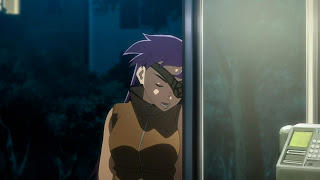 Well, my guess is you’re going to either love or hate this episode for all the above reasons. I think it still feels like Mirai Nikki, so I love it – even the breathless excitement of the steel cage tag-team match between Yuno/Murmur and Yukiteru/Minene. I think the emotional moments here work because they’re well-earned – Minene refusing to abandon her little “Dipshit” Yuki and fulfilling her promise to Fourth, Yukiteru’s “reunion” with his parents and breakdown when his mind couldn’t process it… These moments are true to character in my opinion and that gives them a punch they would otherwise lack. For all the cleverness of the plot and the commentary behind it, none of this would work if the characters couldn’t carry the story. I feel more optimistic than ever that Asread understand Mirai Nikki well enough to pull off the ending as Esuno intended it. From there, it’s going to be up to you.
Well, my guess is you’re going to either love or hate this episode for all the above reasons. I think it still feels like Mirai Nikki, so I love it – even the breathless excitement of the steel cage tag-team match between Yuno/Murmur and Yukiteru/Minene. I think the emotional moments here work because they’re well-earned – Minene refusing to abandon her little “Dipshit” Yuki and fulfilling her promise to Fourth, Yukiteru’s “reunion” with his parents and breakdown when his mind couldn’t process it… These moments are true to character in my opinion and that gives them a punch they would otherwise lack. For all the cleverness of the plot and the commentary behind it, none of this would work if the characters couldn’t carry the story. I feel more optimistic than ever that Asread understand Mirai Nikki well enough to pull off the ending as Esuno intended it. From there, it’s going to be up to you.
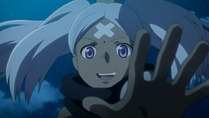 |
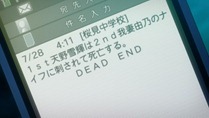 |
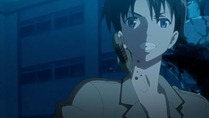 |
 |
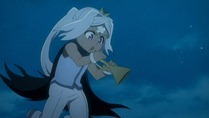 |
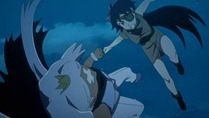 |
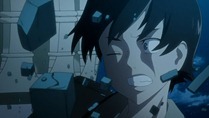 |
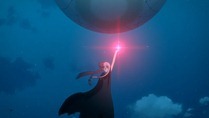 |
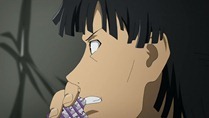 |
 |
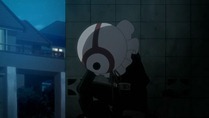 |
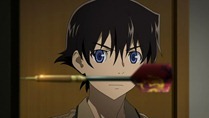 |
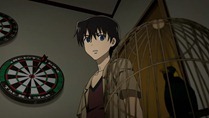 |
 |
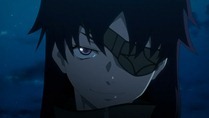 |
 |
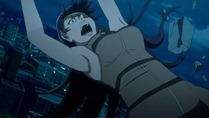 |
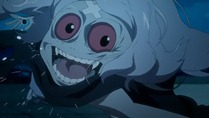 |
 |
 |
 |
 |
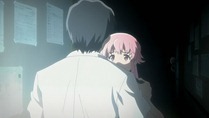 |
 |


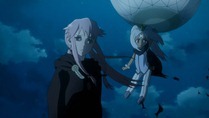
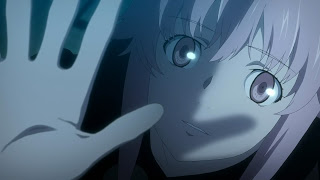
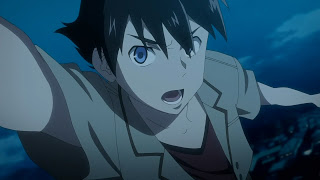
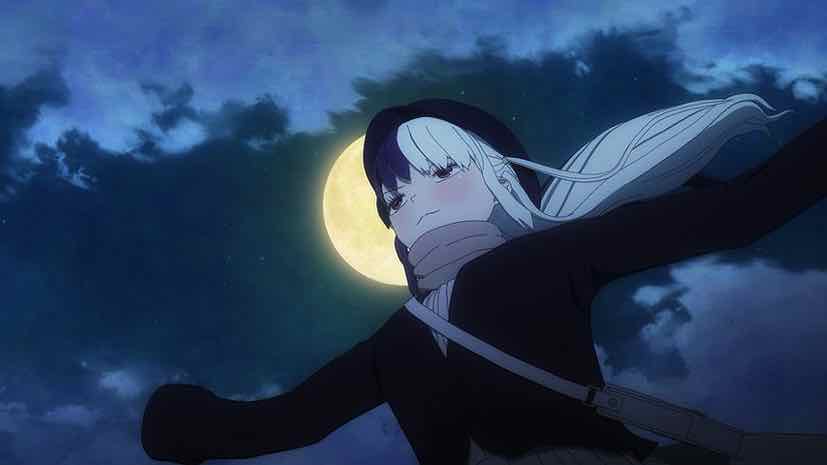
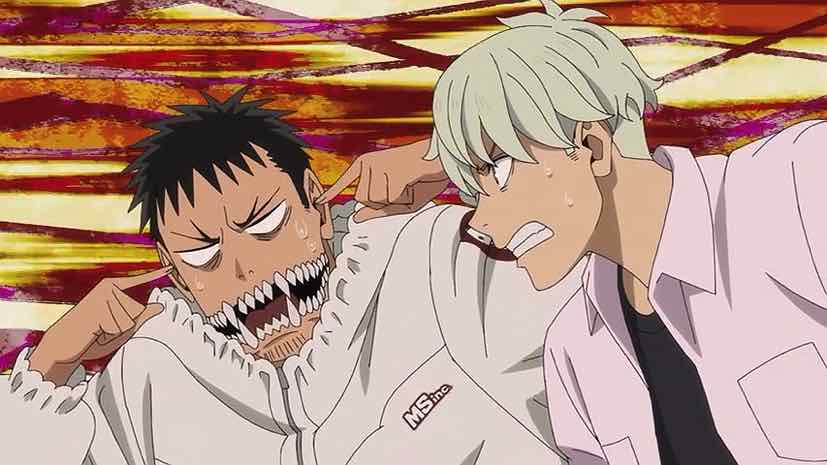
dv
April 10, 2012 at 6:00 amNine keep on saying that this world people are not your people. But even so, Yuno fell in love with the Yukki of the second world.
admin
April 10, 2012 at 6:03 amOf course, because Minene is wrong – in the end, Yuki sees Yuno as Yuno and his parents as his parents, no matter the world. The heart wants what it wants.
aka. Washu! ^O^
February 11, 2013 at 8:39 amI love how MN treats tropes. The wishes trope is interesting. In anime, even if someone is given a wish (more often as that stupid "If you win, I will do anything you say" trope), this wish is very mundane, small, and personal. Contrast this to the rarely used American wishes trope, which usually involves everything in the world (peace on earth, moolah, babes, etc). Well, in MN, wishes *aren't* unlimited, and MN trope deconstruction has our anime hero — unlike practically every anime character who has a wish — questioning his wish to be with his parents. And did you notice the false world Yuki was in almost perfectly matches the comment made of the first, ideal virtual world made for humans in The Matrix? (: